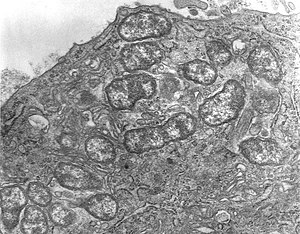Scrub typhus
| Scrub typhus | |
|---|---|
 |
|
| Orientia tsutsugamushi | |
| Classification and external resources | |
| Specialty | Infectious disease |
| ICD-10 | A75.3 |
| ICD-9-CM | 081.2 |
| DiseasesDB | 31715 |
| eMedicine | derm/841 ped/2710 |
| MeSH | D012612 |
Scrub typhus or bush typhus is a form of typhus caused by the intracellular parasite Orientia tsutsugamushi, a Gram-negative α-proteobacterium of family Rickettsiaceae first isolated and identified in 1930 in Japan.
Although the disease is similar in presentation to other forms of typhus, its pathogen is no longer included in genus Rickettsia with the typhus bacteria proper, but in Orientia. The disease is thus frequently classified separately from the other typhi.
Signs and symptoms include fever, headache, muscle pain, cough, and gastrointestinal symptoms. More virulent strains of O. tsutsugamushi can cause hemorrhaging and intravascular coagulation. Morbilliform rash, eschar, splenomegaly, and lymphadenopathies are typical signs. Leukopenia and abnormal liver function tests are commonly seen in the early phase of the illness. Pneumonitis, encephalitis, and myocarditis occur in the late phase of illness.
Acute scrub typhus appears to improve viral loads in patients with HIV. This interaction is challenged by an in vitro study.
...
Wikipedia
